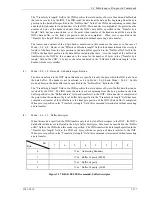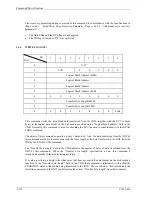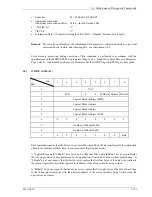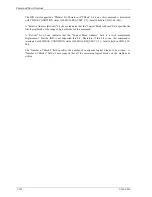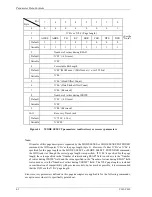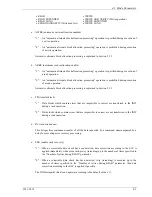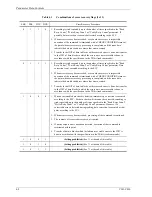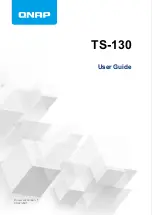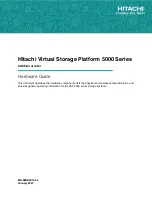
4.1 Mode Parameters
C141-C010
4-9
Table 4.1
Combinations of error recovery flags (3 of 3)
EER
PER
DTE
DCR
Error Recovery Procedure
1
1
0
0
1.
When a correctable data check is detected, immediately, correction is executed
according to the ECC. For data checks which cannot be corrected, rereading is
tried repeatedly up to the number of times specified in the "Read Retry Count",
"Write Retry Count" or "Verify Retry Count" parameter. However, if a
correctable error is detected during reading, data correction is executed at that
point according to the ECC.
2.
When error recovery has succeeded, processing of the command is continued.
3.
If unrecoverable errors have been detected, execution of that command is
terminated at that point.
4.
Transfer of data in blocks which include unrecoverable errors to the INIT is
done in accordance with the specification in the TB bit (read commands).
5.
When recovery from all detected errors has been successful, a CHECK
CONDITION status (RECOVERED ERROR [=1]) is reported after all
processing of the command is completed and the sense data indicate the content
of the last error that was successfully recovered from and the address of the data
block where that error occurred. However, if the error is corrected with ECC
only, the CHECK CONDITION is not reported and no sense data is created.
1
1
0
1
(Setting prohibited) (See *1 at the end of this table.)
1
1
1
0
1.
When a correctable data check is detected, immediately, correction is executed
according to the ECC. For data checks which cannot be corrected, rereading is
tried repeatedly up to the number of times specified in the "Read Retry Count",
"Write Retry Count" or "Verify Retry Count" parameter. However, if a
correctable error is detected during reading, data correction is executed at that
point according to the ECC.
2.
When error recovery has succeeded, or even when recovery is impossible,
execution of the command is terminated with a CHECK CONDITION status at
the point when error recovery processing is completed, and the sense data
indicate the data block address where that error occurred.
3.
Transfer to the INIT of data in blocks with recovered errors is done, but transfer
to the INIT of data blocks in which the errors were unrecoverable is done in
accordance with the specification in the TB bit (read commands).
1
1
1
1
(Setting prohibited) (See *1 at the end of this table.)
*1 If a setting-prohibited combination of error recovery flags is specified, the MODE SELECT or
MODE SELECT EXTENDED command is terminated with a CHECK CONDITION status
(ILLEGAL REQUEST [=5] / Invalid field in parameter list [=26-00]) and all the parameters
specified at that time are disabled.
Remark:
Just as explained for the EER, PER, DTE and DCR bits, the IDD can only make a valid specification for
the PER bit. Therefore, among the error recovery flag combinations listed above, the only one which
can actually operated is (EER, PER, DTE, DCR) = (1, 0, 0, 0) and (1, 1, 0, 0).
Summary of Contents for 80
Page 4: ...This page is intentionally left blank ...
Page 10: ...This page is intentionally left blank ...
Page 18: ...This page is intentionally left blank ...
Page 62: ...This page is intentionally left blank ...
Page 284: ...Sense Data Error Recovery Methods This page is intentionally left blank ...
Page 296: ...This page is intentionally left blank ...
Page 298: ...This page is intentionally left blank ...
Page 308: ...This page is intentionally left blank ...
Page 309: ......
Page 310: ......

